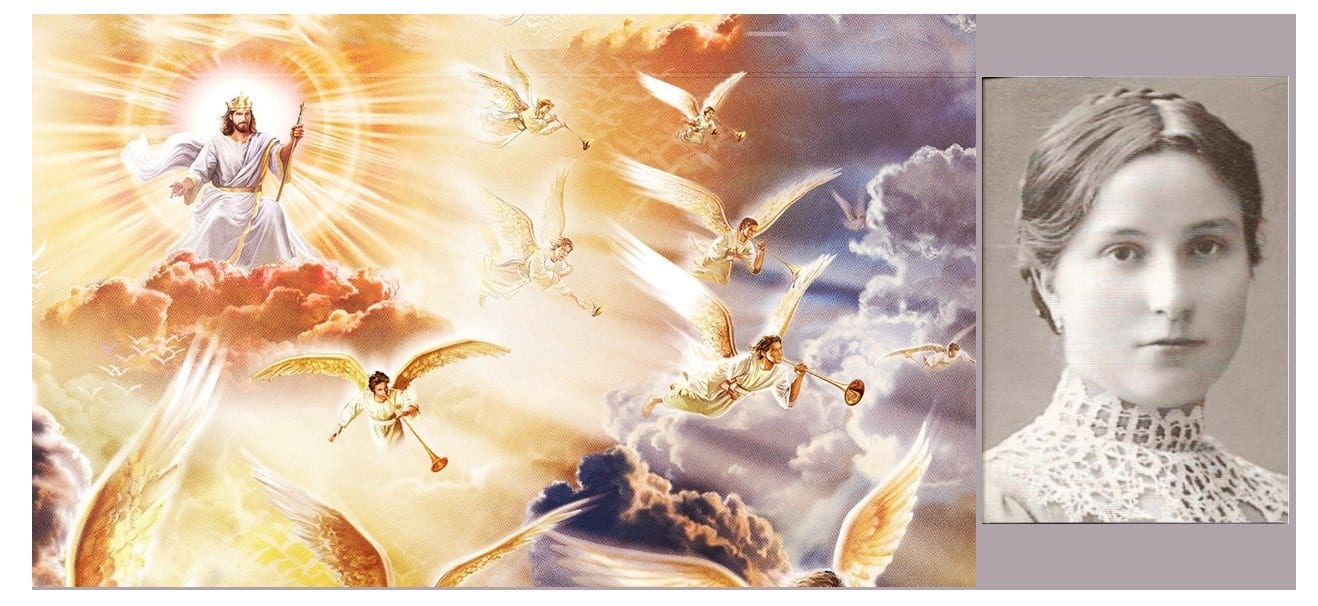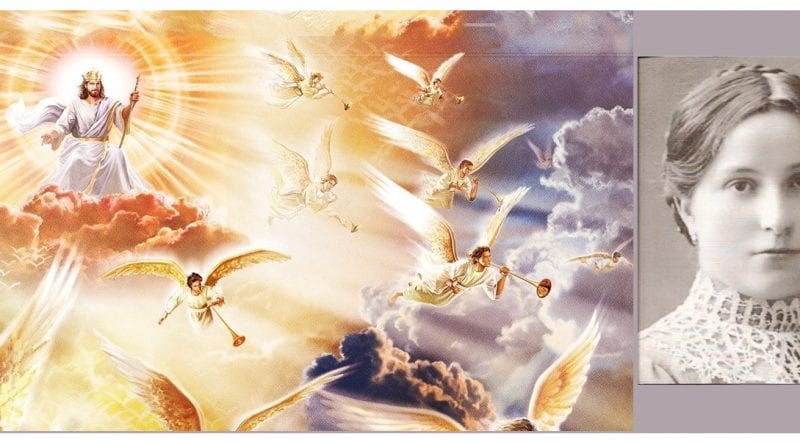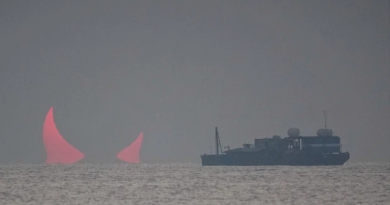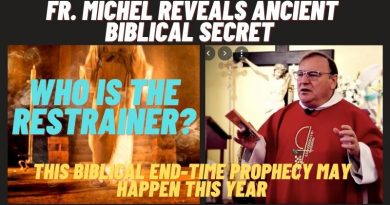Jesus: “The souls immersed in those flames suffer only from love.” Mystic Maria Valtorta Reveals the Secrets of Purgatory
The excerpts presented here are translated from the critical Italian edition of the IL Quaderni del 1943 …1944 (“Notebooks for 1943 …1944” ) of the great contemporary Italian mystic, Maria Valtorta (1961†). This collection of mystical revelations Valtorta attests were given her by Christ in the form of interior Locutions or direct Dictations and Visions. Amid her many sufferings she was given them for her own spiritual consolation and growth, as well as for the guidance of the Church today. These revelations, moreover, pre-date by only a few months similar Visions and Locutions which Valtorta would soon begin to record in a separate series of ordinary school notebook pads, while propped up as an invalid in her sick-bed the last 26 years of her life. That separate series of subsequent revelations would constitute her major 10-volume (in Italian) spiritual masterpiece: The Poem of the Man-God.1 It is especially for this latter Work that Valtorta is becoming best known and acclaimed, a Work which not a few notable personages have read and recommended for publication. Among these are: Pope Pius XII, as well as the eminent Scripture scholars, Augustine Cardinal Bea, S.J., and Fr. Gabriel Allegra, O.F.M. — INTRODUCTION —
“I want to explain to you what Purgatory is and in what it consists. And I explain it Myself, with a form that will clash with so many who believe themselves to be trustees of knowledge of the Beyond — and are not.
The souls immersed in those flames suffer only from love.
Not undeserving of possessing the Light, but not yet worthy of entering immediately into that Kingdom of Light, these souls, upon presenting themselves to God,8 become clothed with the Light. It is a brief, anticipated bliss, which makes them certain of their salvation, and makes known to them what their eternity will be. It makes them experience what they had committed toward their soul; thus defrauding it of years of the blessed possession of God. Immersed thereafter in the Place of Purgation, they are clothed with the expiatory flames.
In this matter, those who talk of ‘Purgatory’ speak rightly. But where they are not right is in wanting to apply various names to those flames.
These flames are a conflagration of Love. They purify by enkindling souls with love. They give Love because, when the soul has reached in them that love which it did not reach on earth, it is liberated and joined to Love in Heaven.

This seems to you a different doctrine than what is known — true? But reflect.
What does God, One and Triune, want for the souls created by Him? The Good.
He Who wants the Good for a creature, what sentiments does He have for that creature? Sentiments of Love.
What are the first and the second commandments, the two most important? Those of which I have said there are no greater, and in which are the keys for reaching Eternal Life? They are a commandment of love: ‘Love God with all your strength, love your neighbor as yourself.’9
Through My own mouth and by the prophets and the saints, what have I said to you an infinite number of times? That Charity is the greatest of absolutions. Charity consumes the faults and the weaknesses of man, because he who loves lives in God, and by living in God he sins little; and if he sins he at once repents, and for him who is repentant there is the forgiveness of the Most High.
What is lacking to souls? Love. If they had loved much, they would have committed few and light sins, connected with your weakness and imperfections. But they would never have reached a conscious obstinacy in faults, even venial ones. If they would have striven not to grieve their Love, Love also, seeing their good will, would have absolved them even of the venial transgressions they committed.
How does one repair, even on earth, a fault? By expiating it — even if only with difficulty — through the means with which it was committed. He who has damaged something, by restoring whatever he has taken away with his insolence. He who has calumniated, by retracting the calumny, and so on.
Now: if poor human justice wants this, will not the holy Justice of God want it? And what means will God use to obtain reparation? Himself, that is, Love, and by exacting love.
All pivots on love, Maria, except for the truly ‘dead’: the damned. For these ‘dead,’ even Love is dead. But for the three Kingdoms — that of the heaviest: the Earth; that in which the weight of matter is abolished, but not of the soul burdened by sin: Purgatory; and finally that in which its inhabitants share with their Father the spiritual nature which frees them from every duty — for all three the motor is Love. It is by loving on earth that you work for Heaven. It is by loving in Purgatory that you conquer Heaven which in life you had not known how to merit. It is by loving in Paradise that you enjoy Heaven.
When a soul is in Purgatory it does not do anything but love, reflect, repent in the light of Love which has kindled for it these flames — which already are God, but which hide God from it for its punishment.
Behold the torment. The soul remembers the vision of God it had in its particular judgment. That memory is carried with it and, since to have even but glimpsed God is a joy which surpasses every created thing, the soul thus has anxiety to enjoy again that joy. That memory of God and that ray of light which had clothed it at its appearing before God, thus cause the soul to ‘see’ in their true essence the failures committed against its Good. And this ‘seeing,’ together with the thought that it has voluntarily forbidden itself the possession of Heaven and union with God for ages or centuries, constitute its purgative pain.
It is love, and the certainty of having offended Love, which is the torment of those being purged. The more a soul in life has failed, the more it is as if blinded by spiritual cataracts which make more difficult its knowing and reaching that perfect repentance of love which is the first collaboration with its purgation and its entrance into the Kingdom of God.
Love is weighed down and slowed down the more a soul has oppressed it with guilt. But as the power of Love cleanses it little by little, its resurrection to love is quickened and, in consequence, so is its conquest of Love — which is completed in the moment in which, having finished its expiation and reached the perfection of love, it is admitted into the City of God.
There is need to pray much so that these souls, who suffer in order to reach Joy, may be swift in reaching the perfect love that absolves them and unites them to Me. Your own prayers, your suffrages, are as so many increases in the fire of love. They increase its ardor, its heat. But — oh! blessed torment! — they also increase the capacity to love. They quicken the process of purgation. They raise to ever higher levels the souls immersed in that fire. They bring them to the threshold of Light. And, at last, they open the Gates of Light and introduce the soul into Heaven.
For each of these works provoked by your charity for one who has preceded you into the second life, there is a corresponding jump in charity for you. The Charity of God which thanks you for providing for His repentant children, the charity of the repentant themselves, who thank you for endeavoring to place them in the Joy of God.
Never do your dear ones love you as they do after their death from the earth, because their love is thereafter infused with the Light of God, and in this Light they understand how you love them and how they should have loved you.
They cannot speak words to you any more which invoked forgiveness and give love. But they speak them to Me for you, and I bring them to you, these words of your Dead, who now know how to see and love you as they ought. I bring them to you together with their requests of love and with their blessing, already valid inasmuch as from Purgatory, because already infused with that kindled Charity which burns and purifies them. And [it is] perfectly valid, then, from the moment in which, being liberated, they come to meet you upon the threshold of Life, or will be reunited to you in that same Life, if you have already preceded them into the Kingdom of Love.
Trust in Me, Maria. I work for you and for your dearest ones. Lift up your spirit. I come to give you joy. Trust yourself to Me.”
Since you’re here …
… we have a small favor to ask. More people are reading Mystic Post than ever but advertising revenues across the media are falling fast. And unlike many news organisations, we haven’t put up a paywall – we want to keep our journalism as open as we can. So you can see why we need to ask for your help. Mystic Post’s independent journalism takes a lot of time, money and hard work to produce. But we do it because we believe our perspective matters – because it might well be your perspective, too.
High quality journalism is essential intellectual nourishment. The generosity of providing such a service without a paywall deserves recognition and supportGiacomo P, Italy
I’ve been enjoying Mystic Posts for several years now. Today, when so much seems to be going wrong in the world, Mystic Post is working hard to provide truthful Catholic news. I want to support that Robb R. UK
I appreciate there not being a paywall: it is more democratic for the media to be available for all and not a commodity to be purchased by a few. I’m happy to make a contribution so others with less means still have access to information. Annonymous Donator
If everyone who reads our reporting, who likes it, helps to support it, our future would be much more secure.
Thank you
$1.00 $10,00 $25.00 $1,000 – Any contribution makes a big difference.
Make a contribution
With a $25.00 donation receive a free miraculous medal. We can really use it – THANKS!






On 16 December 1959, the Congregation of the Holy Office ordered the 4-volume work entitled “The Poem of the Man-God” placed on the Index of Forbidden Books.[16] Pope John XXIII approved the decree and directed that the condemnation be published. The decree was then promulgated by the Holy Office on January 5, 1960.[17] The decree was published also in L’Osservatore Romano of 6 January 1960, accompanied by a front-page article under the heading “A Badly Fictionalized Life of Jesus”.[2] After publication of a second edition by the same publisher, the Vatican newspaper republished the content of the decree on 1 December 1961, together with an explanatory note.
Cardinal Joseph Ratzinger, Prefect of the Congregation for the Doctrine of the Faith, in his letter 144/58 of 31 January 1985, entrusted to Cardinal Giuseppe Siri, Archbishop of Genoa, the decision whether to inform a priest of his archdiocese that the Valtorta work had indeed been placed on the Index, which keeps its moral force, and that “a decision against distributing and recommending a work, which has not been condemned lightly, may be reversed, but only after profound changes that neutralize the harm which such a publication could bring forth among the ordinary faithful”.[18][19] Cardinal Siri not only informed the priest, but also published (with the name of the priest removed) the text of Cardinal Ratzinger’s letter.
Dear readers,
I am always looking at mystic posts articles and reading them openly and I always search the Truth related, I suggest to all readers to do so and not take all contents of every article as theologically true specially when the CDF has not approved the authenticity.
Dear all, with all the stories and all the talkings about mystic things remains personal experience and can’t be a teaching to enhance our faith on the contrary it could lead us to believe and trust only miracles and forget the love of Jesus and each others.
I salute all of you with the Love of Trinity Lord.
Bassam